The Withdrawal Syndrome – Part II
The Withdrawal Syndrome – Part II
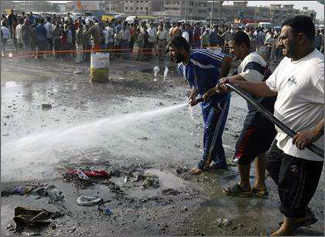
LONDON: Until recently the words “Vietnam” and “quagmire” were unmentionable in the Bush White House’s discourse on the Iraq war.
But, the stream of bad news from Iraq turned into a flood with the onset of the holy month of Ramadan, and opinion polls point toward the Republicans’ loss of the House of Representatives.
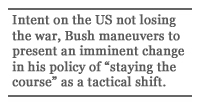
President George Bush conceded that Iraqi insurgents’ increased violence was comparable to the Tet offensive in South Vietnam. In January 1968, Vietcong guerrillas in South Vietnam and North Vietnamese troops jointly attacked US and South Vietnamese targets. Their offensive undermined Pentagon claims that the US was in control of the situation and drained Americans’ confidence in President Lyndon Johnson. Instead of seeking re-election, he retired from politics.
Intent on the US not losing the war, Bush maneuvers to present an imminent change in his policy of “staying the course” as a tactical shift.
Nonetheless, as Richard Haass, former director of US State Department’s policy planning under Colin Powell, put it, “a tipping point” has been reached in American politics with regard to Iraq. If Bush’s change of direction ends willy-nilly as an ignominious withdrawal of US troops, then the Middle East and the rest of the world will lose their awe of the sole superpower’s military might.
October 2006 was lethal for the US military in Iraq, with 105 troops killed. Meanwhile, Iraqi civilian deaths run at nearly a hundred a day. Polls show two-thirds of Americans regard the war as going “somewhat or very badly.”
In response, the White House leaked the information that top officials are setting political and military benchmarks for the government of Iraqi Prime Minister Nouri al Maliki. “The New York Times” reported that the “benchmarks” pertain to disarming militias, halting sectarian violence and shouldering more responsibility for security.
The benchmark concept had surfaced earlier in leaked stories from the Iraq Study Group (ISG), appointed in March by Congress, with Bush’s approval, to examine the worsening crisis.
One of its so-called “classified” recommendations is to specify benchmarks for the Maliki government to fulfill in the process of taking over the task of securing Iraq, thus enabling the Pentagon to withdraw its troops first to large bases inside Iraq and then to neighboring countries, leaving only US military advisers embedded with the Iraqi army.
The main source of ISG leaks seems to be James Baker, the group’s co-chair, along with democrat Lee Hamilton, former congressman and vice-chair of the US 9/11 Commission.
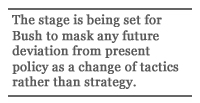
Former secretary of state under President George Herbert Walker Bush, Baker is a loyal Republican and a longstanding friend of the Bush clan. Though holding no official position in the present administration, he meets with George W. Bush frequently to discuss “policy and personnel.”
By leaking proposals to be officially unveiled by ISG in January 2007, Baker sets the stage for Bush to mask any future deviation from present policy as a change of tactics rather than strategy.
Significantly, in his October 21 radio broadcast, Bush said: “What is changing are the tactics we use is to achieve that goal [of victory].”
The definition of “victory” has undergone a sea change since Bush’s declaration of “Mission Accomplished” aboard the USS Abraham Lincoln on May 1, 2003.
From the beginning the Bush administration had Iraq in its sights. At the first meeting of the newly constituted National Security Council on January 30, 2001, Defense Secretary Donald Rumsfeld offered an assessment of the broader US goal of overthrowing Saddam Hussein, according to “The Price of Loyalty,” published in 2004 by Ron Suskind.
“Imagine what the region would look like without Saddam and with a regime that is aligned with U.S. interests,” Rumsfeld said. “It would change everything in the region and beyond. It would demonstrate what U.S. policy is all about.”
American neoconservatives and their exiled Iraqi allies fed a dire assessment of Saddam’s regime into a White House that was set on invading Iraq regardless of the facts on the ground.
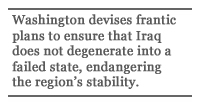
A scenario of post-Saddam Iraq crystallized: The new Iraq would be democratic, capitalist, peace-loving, ready to offer permanent military bases to the Pentagon. Its privatized oil industry would integrate with US petroleum corporations and opt out of the Organization of Petroleum Exporting Countries (OPEC), thereby weakening it. A flourishing democracy would engender a domino effect, turning the region into a haven of democratic politics, co-existing peacefully with Israel.
More than three years later, however, Washington devises frantic plans to ensure that Iraq does not degenerate into a failed state, endangering the region’s stability as well as US security. Bush now aims for nothing more than a “stable Iraq able to defend itself.”
A pragmatic Baker visualizes Washington abandoning its long-term goal of democracy in the Middle East, and suggests that “victory” be defined as “achieving representative government, not necessarily democracy.”
Opening the previously strong public sector of Iraq to foreign companies by denationalizing 200 state-owned companies reduced the stake that Iraqis had in their own economy and increased unemployment.
At the first hint of denationalization, however, Iraq National Oil Company employees resorted to large-scale sabotage from which the industry has yet to recover. So Washington shied away from privatizing Iraq’s petroleum industry
While OPEC continues to exempt Iraq from its quota system – a policy dating back to time of United Nations sanctions on Iraq to reduce Iraqis’ suffering – Baghdad has no intention of leaving OPEC.
Given the perilous lack of security in Iraq, no major foreign oil companies, American or not, now eye Iraq’s hydrocarbon resources.
Politically, the mayhem created by the Anglo-American invasion and its aftermath has set back the cause of non-Iraq Arabs who pushed for political reform at home before 2003.
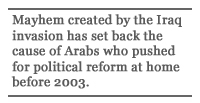
Now the leaders of the authoritarian and semi-authoritarian Arab regimes warn that the American model of democracy will tear apart national identity and create divisive sectarian and ethnic identities, turning the region into mini-states along the post-Yugoslavia model. They have successfully marginalized the advocates of political liberalization by describing them as allies of the unpopular Bush administration.
Within Iraq, the key question is: Can federated Iraq be established without ethnic-sectarian cleansing? The answer has to be no. The four major cities – Baghdad, Basra, Mosul and Kirkuk – accounting for more than half the national population are ethnically and religiously mixed. The only realistic solution could be housing segregation in these cities.
The most effective way for Shiite and Kurdish leaders to win over reluctant Sunni counterparts on accepting a federal Iraq would be to agree to a formula of allocating oil income to each of the 18 provinces according to population and echoing the Sunnis’ hostility to the presence of the American troops.
With Muqtada al Sadr’s Shiite followers sharing Sunni hatred of the US forces, chances of the Iraqi government allowing the Pentagon long-term military bases on its soil are minimal.
Stabilization of Iraq is urgently needed. If Bush decides to adopt the Iraq Study Group’s “leaked” recommendation of getting Iraq’s neighbors – including Shiite Iran and Sunni Syria – involved in stabilizing chaotic Iraq, there is a chance of a tenuous restoration of law and order to let the Pentagon withdraw its forces in stages. But Bush has ruled out talks with Syria and Iran.
So the odds are that Bush will preside over a messy retreat from Iraq, leaving behind a country in the throes of a civil war likely to suck in its neighbors, and eroding further Washington’s already low standing in the region.
Dilip Hiro is the author of “Secrets and Lies: Operation ‘Iraqi Freedom’ and After” published by Nation Books.